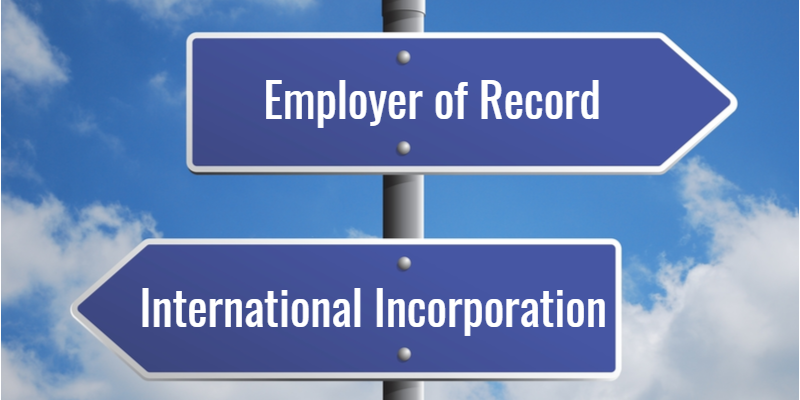
By
Leanna Seah
March 1, 2021
Updated
September 2, 2024
Expanding your business internationally can be simultaneously intimidating and gratifying. Setting up a legal international business entity requires extensive planning and attention to detail.
From analysing your legal and financial commitments to mobilising your existing staff and hiring new talent, there are many underlying elements of great importance that go into successful business expansion.
The complexity involved in ensuring that everything is perfectly set up is why many companies opt to work with an Employer of Record partner instead of setting up an international entity.
What is international incorporation?
International incorporation refers to setting up a fixed offshore company that provides a business with a physical and legal presence in a foreign country.
The process often entails registering the company with the local and national governments, setting up a branch office, and finally establishing a subsidiary company in the host country.
Your business should have enough capital to qualify for a local bank account. You should also have a solid legal, HR, and finance team to help you maintain compliance with the local laws and regulations governing your host country.
What is an Employer of Record, and how does it support business expansion?
An Employer of Record (EOR) functions as a third-party organisation that allows a client company to hire new talent without setting up an entity in a foreign country.
In cases such as this, the EOR usually has a physical entity in place and appears on paper as the legal employer. All matters relating to talent acquisition, hiring, the decision-making with regards to the employee’s role, as well as decisions relating to employee dismissal will be handled by the client company.
Amidst a business expansion, an employer of record can help by providing these services:
![]() Arrangement of the employment contract (client company is responsible for setting up the terms and conditions)
Arrangement of the employment contract (client company is responsible for setting up the terms and conditions)![]() Payroll management
Payroll management![]() Work permits and visas
Work permits and visas![]() Insurance and tax
Insurance and tax![]() Handling expenses and timesheets
Handling expenses and timesheets![]() Faster entry to market
Faster entry to market![]() Lower costs and risks
Lower costs and risks
One of the main reasons why many companies opt for an EOR is that it enables them to very quickly get their business up and running beyond borders. Sometimes in as little as 48 hours.
With the EOR acting as the legal entity responsible for hiring a foreign employee, companies can start operating internationally as soon as they have made a hire in said country.
An EOR also allows businesses to capitalise on global talent and take advantage of new market opportunities that might not be available within their region.
Other noteworthy perks of partnering with an EOR include:
- Avoid risks of being non-compliant with the local labour laws of host countries.
- Minimal risks are involved when expanding to new markets due to not having to set up a subsidiary.
- Businesses can expand into multiple countries simultaneously.
- Cost savings due to not having to set up a physical entity.
- Partnership with experts in local labour law and regulation means that companies don’t have to worry about the changing legislation that govern their host country.
- Efficient hiring of employees in your new market who are familiar with the local business culture, landscape, language and more.
- Local HR experts who can run and keep track of employee payroll on a business's behalf.

Source: ImageFlow/Shutterstock
An Employer of Record offers many benefits, but international incorporation also adds value
These advantages include:
Specialised incentives for foreign businesses
Many countries across the globe encourage foreign investment. Therefore, they provide various incentives to international companies looking to expand into their territory. Examples of these can include:
![]() Free trade or special economic zones
Free trade or special economic zones![]() Relaxed restrictions on foreign-owned companies
Relaxed restrictions on foreign-owned companies![]() Reduced corporate tax rates
Reduced corporate tax rates![]() Simplified incorporation procedures
Simplified incorporation procedures![]() Relocation and expatriation support
Relocation and expatriation support![]() Job training subsidies
Job training subsidies
Affordable production and manufacturing costs
Some markets possess advanced manufacturing infrastructures. This results in more affordable material and production costs. Setting up a foreign subsidiary in these locations can grant businesses greater access to lowered production and labour expenses.
Build business relationships with local partners
Incorporating a legal entity in a foreign country puts businesses at the forefront of connecting with local partners and building profitable relationships. It also enables them to take advantage of local expertise and knowledge.
For a more thorough list of advantages as well as a useful checklist of important factors to consider, our article on international business incorporation is a great resource for further reading.
Global employment and mobility (GEM) solutions and international incorporation
When international incorporation is the best option amidst a global expansion, a global employment company can be very helpful. GEM solutions comprise various components that range from HR consulting to global immigration, payroll outsourcing and relocation services.
See Airswift's full list of Global Employment and Mobility services and how they fulfil these needs.

Source: hamidisc/shutterstock
Employer of Record vs Incorporation: Which one should I choose?
When selecting between the two, comparing them based on several important factors can provide greater clarity during the decision-making process.
| Factor | Incorporation | EOR |
| Laws & regulations | The business is responsible for staying up to date on the latest changes in local labour laws and maintaining compliance with the requirements | The EOR manages this entire process on behalf of the business and local experts ensure that the company remains compliant and up to date |
| Hiring & contracts | The business handles the direct hiring of the talent and manages the onboarding process from start to finish. This includes the drafting of contracts that must be compliant with local labour laws | The business is responsible for deciding who to hire, their start date, managing their daily responsibilities and making the decision to terminate a contract. The EOR steps in to manage the contract and ensure that onboarding procedures align with country-specific regulations |
| Culture & language | In some cases, the business will have to independently enlist local experts to help them navigate through the local business practices and culture of their host country. Especially if a different language is spoken | An EOR usually has a team in place who are native to the language and customs of the host country. A business that partners with an EOR will have access to their expertise |
| Taxes | The business must familiarise themselves with the local taxes and navigate through the filing procedures for that specific country | The EOR is responsible for managing tax payment procedures on behalf of the company |
| Employee compensation & benefits | The business is expected to set up a benefits package to retain and attract employees. This can be a costly commitment especially if it is put into place for a small headcount of employees in the host country | An EOR will often have a local benefits package set up that they can offer to a business’s employees for a fee |
| Time to set up | This can vary according to country, but it can take an average of two months to a year | Upon finding the right candidate, an EOR can help onboard your new staff and get things up and running within 48 hours |

Source: ChristianChan/Shutterstock
Additional factors to consider
Before deciding on whether incorporation or partnering with one is right for your business, ask yourself these questions.
What is the scale of my business’ expansion?
It’s important to know how much you are willing to invest in a new market. Determine if this is just an experimental move or if you see it as a market with strong growth potential that warrants long-term commitment.
Are you planning to expand into multiple different countries and only want to hire a small handful of employees, if this is the case, then perhaps working with an EOR will provide you with the flexibility you need.
For many businesses who often plan for long-term incorporation but also want the added benefit of swiftly entering new markets, keep in mind that you can always start out by working with an EOR and eventually enlist further GEM services once you’ve made the decision to incorporate internationally.
How familiar am I with the rules and regulations that govern the targeted location?
When it comes to asking questions about the legal and regulatory considerations in the midst of international expansion, the PESTEL framework can be extremely useful in ensuring that you cover all of your bases.
One should never assume that all things are going to work the same way they do in their home country and this is especially true when it comes to the regulations surrounding international business incorporation. They can be vastly different from country to country and failing to be compliant with them can incur costly fines.
Working with an EOR can help to minimise that risk and take the responsibility off your shoulders while allowing you to focus on other aspects of your company’s growth. This is especially important if you are not familiar with the language that is spoken in the targeted location.
How much is this going to cost me?
Taking stock of the necessary expenses that come with international incorporation is a vital step and, in some cases, it can be difficult to make an estimate of the financial requirements that go into employee compensation, business registration fees, interest rates and more.
We address the questions surrounding hidden costs and more in our recent webinar on how to avoid the common mistakes that come with international business expansion.
Simplify your global expansion plans with Airswift
Going global is an exciting step and here at Airswift, our goal is to stand by you at every stage of your journey. Regardless of whether you decide to work with an Employer of Record or want to seek out support in the midst of setting up a new international entity, our various solutions can be customised to suit your evolving needs.
Get in touch with us today to learn more about our services.
